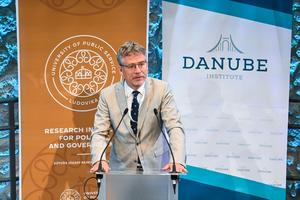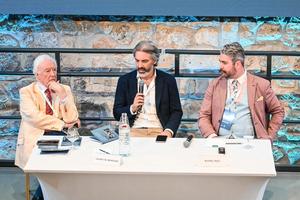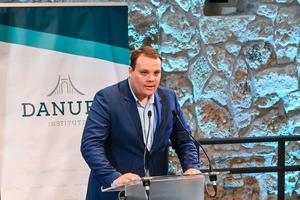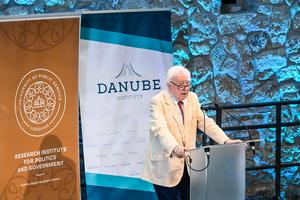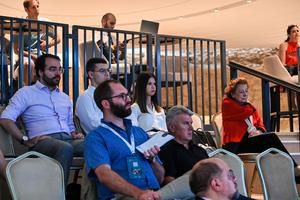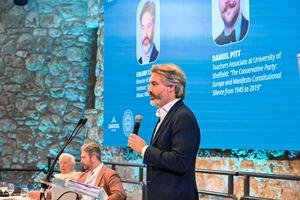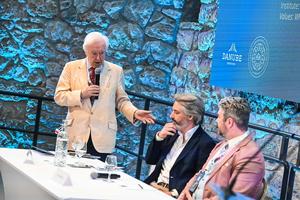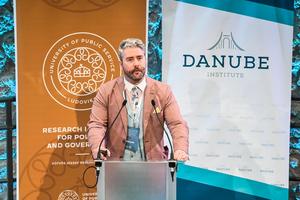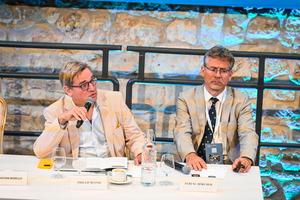On 18 June 2024, the Research Institute for Politics and Government of the Eötvös József Research Centre at the Ludovika University of Public Service together with the Danube Institute held an international conference at the Lónyay–Hatvany Villa discussing British and European conservative visions of Europe’s future. The event centred around the fundamental rights of free speech and freedom of thought, now under serious threat by extreme leftist movements and Woke ideology. It was the third event of a series of conferences on British conservatism that started in 2022 in Budapest, followed by last year’s conference held at Churchill College, Cambridge, organised by Ferenc Hörcher, Phillip Blond and Daniel Pitt.
Participants and the audience were greeted by John O’Sullivan CBE, the president of Danube Institute, István Kiss (executive director of Danube Institute) and Ferenc Hörcher (director of RIPG), who shared their thoughts on the importance of the discussed topic in light of the recent European Parliamentary and the upcoming British and American elections.
The first session of the conference was chaired by John O’Sullivan, and discussed European political values and British political realities. It started with the lecture of Calum T. M. Nicholson (director of research at Danube Institute), according to whom the distinctive element of Christianity-based European culture is the moral control over worldly power. Daniel Pitt (University of Sheffield/University of Hull) analysed Conservative Party manifestos regarding the issue of European integration and Human Rights.
The second session, chaired by Phillip Blond (director of ResPublica, visiting professor at Ludovika UPS), dealt with the topic of conservative political philosophers on the future of Europe from a continental perspective. In his online lecture, P. Bracy Bersnak (Christendom College) talked about the rational defence of sacred institutions in the political thought of Joseph de Maistre, whose critique of modernity relied on Enlightened insights, and therefore, cannot easily be deemed as irrational. Ferenc Hörcher, one of the organizers of the conference, discussed the concept of Europe in the thinking of Popes Saint John Paul II and Benedict XVI. Both of the church leaders were in favour of the project of European integration, but warned of the danger of the denial of its Christian roots and non-negotiable moral principles, and rejected the idea of a European empire based on historical evidence. Sebastian Morello (senior editor of the European Conservative) elaborated his views on the thought of German Catholic philosopher Robert Spaemann and on the Christian concept of personhood that is especially important in light of contemporary debates on bio-ethics.
Speakers of the third session approached the aforementioned topic from a British perspective, chaired by Daniel Pitt. Ojel L. Rodriguez Burgos (University of the Sacred Heart, San Juan PR) held an online lecture on the political philosophy of Kenneth Minogue, focusing on the content of conservatism and how it differs from the “reactionary global right” that is united by an unrestrained scepticism towards globalization. André P. DeBattista (University of Malta) talked about Christopher Dawson’s concept of European history, highlighting the importance of culture based on the Greek, Roman and Judeo-Christian heritage, considered by him as the only solid foundation of European identity, deeming the Enlightened secular view of Europe as false.
The fourth session, chaired by Ferenc Hörcher dealt with the issues of free speech and freedom of thought. Alvino-Mario Fantini (editor-in-chief of the European Conservative) presented strong practical arguments in favour of a wide collaboration between all kinds of conservative and right-wing political parties and movements, arguing for a new transnational “fusionism” in order to counterbalance the destructive policies of the united Left. Matt Beech (University of Hull, UC Berkeley) elaborated his views on the challenges of European conservatism regarding the issues of culture, law and free speech. He defended lawful liberties of expression and warned against the adaptation of progressive language. According to him, conservatives need to have higher standards than their progressive opponents do, by setting an example for plurality and dialogue.
Alvino-Mario Fantini chaired the final session of the conference about the future of the European right. Phillip Blond articulated his views on the future of democracy and the West. According to him, liberalism and nationalism have failed, and the West can only withstand the challenges of a rising civilizational conflict by forming an empire based on Christian values. The last speaker of the conference, Francesco Giubilei (Nazione Futura/Fondazione Tatarella) argued for a new conservative model of Europe based on Classical and Christian values and governed in accordance with the principle of subsidiarity, warning against the forces of mass migration and cancel culture threatening European identity and the existence of Europe as a historically developed cultural entity.
Kálmán Tóth
research fellow
Ludovika UPS EJRC Research Institute for Politics and Government
Photos: Dénes Szilágyi
